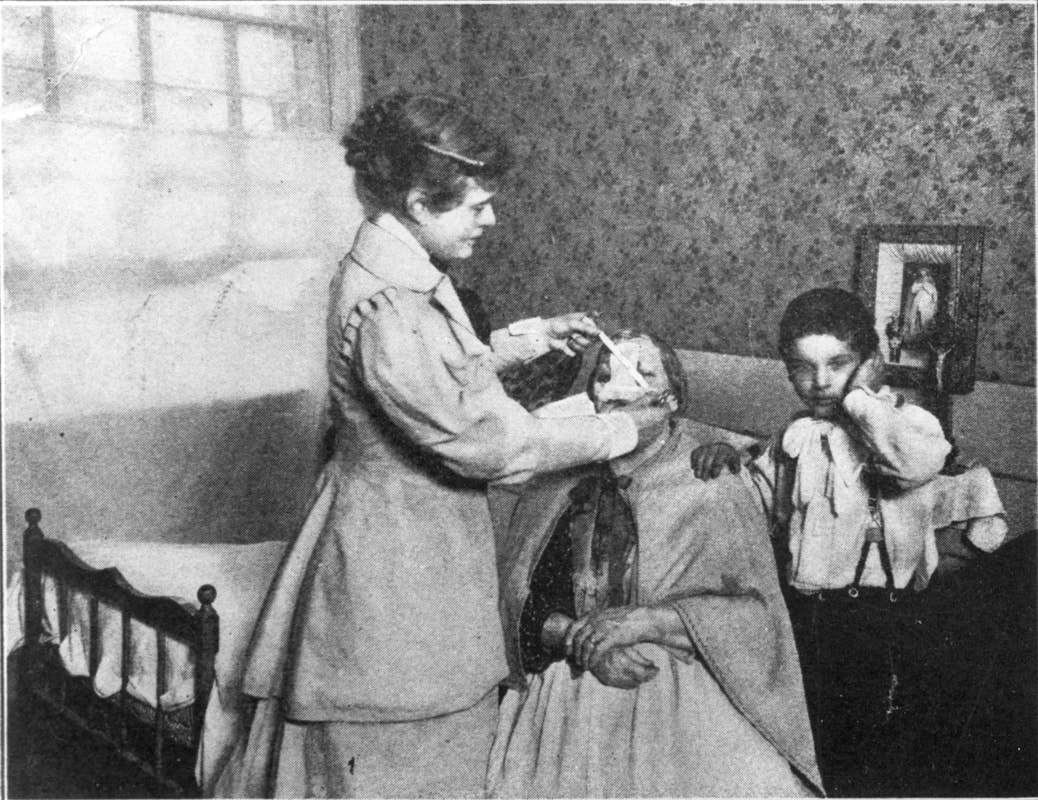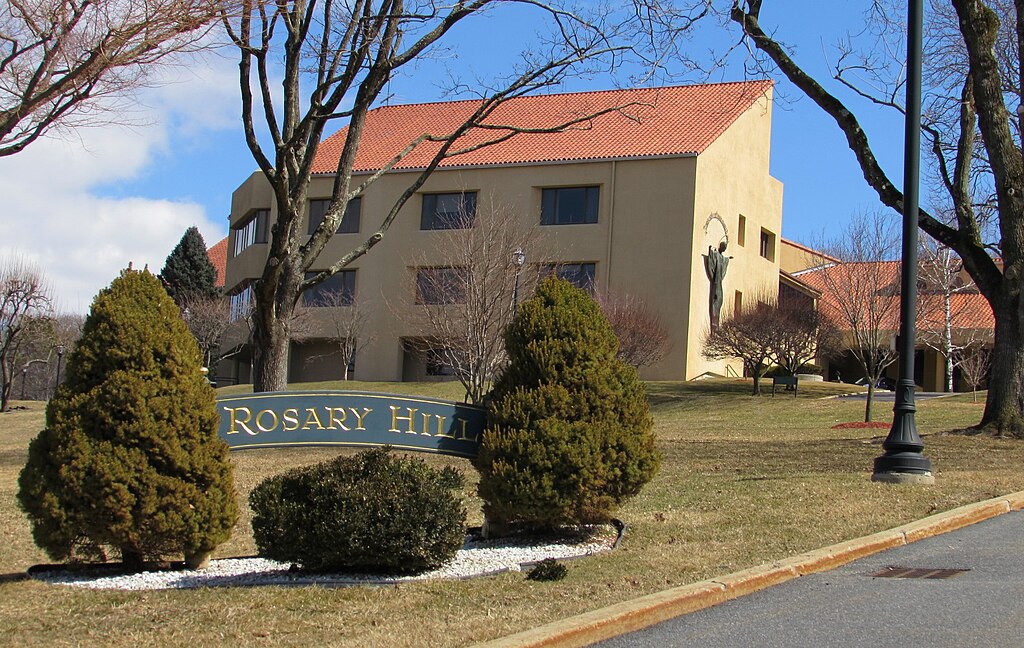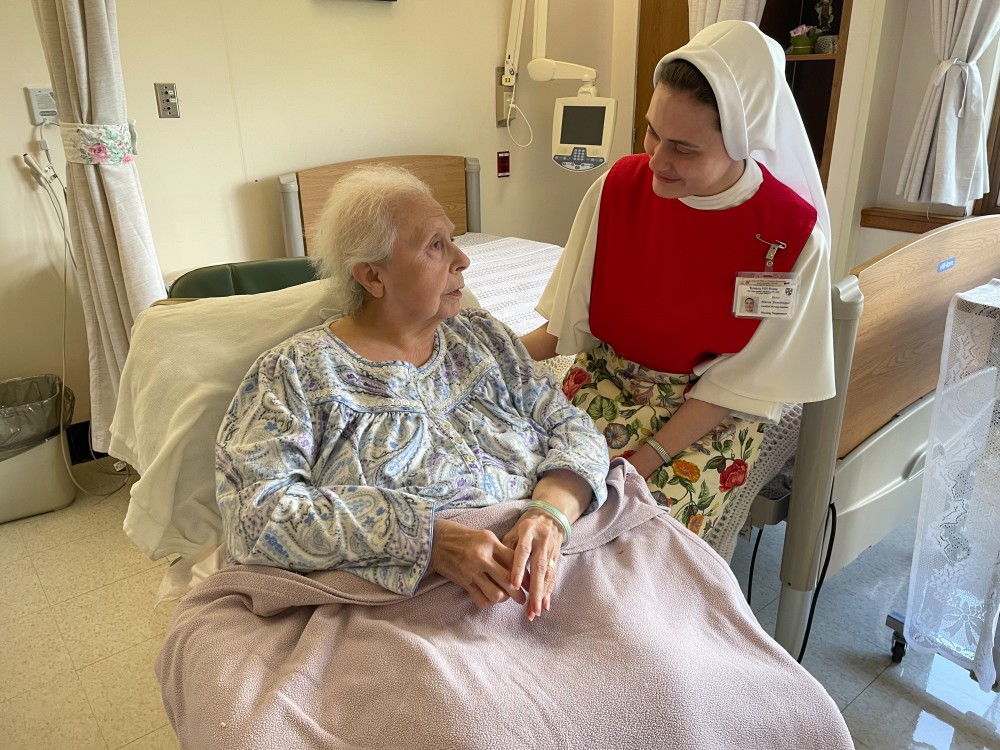
HAWTHORNE, NEW YORK — Pat Simone, 90, always perks up when Sister Marie Dominique walks into her room at Rosary Hill Home because she knows the young nun will bring a smile to her face with a kind word, a warm gesture, or by simply wearing a grin.
“We laugh a lot. She takes good care of me. All of the sisters do,” said Simone, a Brooklyn-born patient at Rosary Hill Home, a skilled nursing facility in Hawthorne, a hamlet in Westchester County, run by the Dominican Sisters of Hawthorne.
Sister Marie and the other sisters who care for patients at Rosary Hill Home are part of a tradition started by Rose Hawthorne (1851-1926), the founder of their religious order.
Rose Hawthorne, the daughter of American novelist Nathaniel Hawthorne (“The Scarlet Letter”), was a trained nurse who dedicated much of her life to serving poverty-stricken cancer patients in the late 19th century and early 20th century — a time when there were few cancer treatments and when patients were often neglected and cast away from society.
Today’s sisters carry on the work of caring for the elderly and the sick with the same loving attitude that their founder displayed. There are 45 women in the religious order and 13 of them work directly with patients at Rosary Hill Home.

These days, there is a great deal of excitement at Rosary Hill House, because Rose Hawthorne, who took the name Mother Mary Alphonsa when she entered religious life in 1900, is a candidate for sainthood.
On March 14, she was declared venerable by Pope Francis, a move that marked the second crucial step in the process of becoming a saint. The first step happened in 2013, when she was designated a Servant of God.
The third step would occur if a miracle is attributed to her intercession and verified by the Vatican. At that time, she will be beatified, and earn the title of Blessed.
The final all-important step on the road to sainthood, canonization, would take place if a second miracle, which must also be verified by the Vatican, is proven to have taken place due to her intercession.
“We are all so excited. And we are hopeful that she will indeed become a saint. We also feel it is a verification of our charism. We are dedicated to caring for the sick,” said Mother Marie Edward, the general superior of the Dominican Sisters of Hawthorne.
But the sisters are too busy to celebrate their founder’s milestone achievement. “There is still work to be done and patients to care for,” Mother Marie explained.
Rosary Hill Home, nestled on a leafy hillside, has approximately 25 patients, many of them elderly and many facing terminal illnesses. “Our goal is to treat every person with the dignity that all human beings deserve,” Mother Marie explained.
Rose Hawthorne grew up in comfortable circumstances as the daughter of a famous American novelist who lived both in the U.S. and abroad. The family was not Catholic but was religious. At the age of 7, Rose had the opportunity to see Pope Pius IX in person when he appeared on his balcony at the Vatican during Holy Week.
She met George Lathrop while living in Germany. The two fell in love and married in 1871. Rose and George converted to Catholicism together in 1891.

However, the marriage was troubled, largely due to Lathrop’s drinking. “But they did love each other. Rose remained in love with George throughout her life,” explained Sister Mary Joseph, who serves as a historian for the Dominican Sisters of Hawthorne.
In a move that was highly unusual at the time, Rose obtained permission from the church to separate from Lathrop, and official separation papers were drawn up and published in newspapers. George Lathrop passed away in 1898.
That same year, Rose Hawthorne enrolled in a nurses’ training program in New York and established St. Rose’s Free Home for Incurable Cancer, named in honor of St. Rose of Lima. The home was located in a tenement on the Lower East Side, one of the poorest and most overcrowded neighborhoods on earth.
“She not only cared for cancer patients, she lived with them,” Mother Marie said. “She felt it was the best way to care for them, by living among them.”
According to Sister Marie, Rose Hawthorne had a scientist researcher buried inside her. “At the time she was treating cancer patients, it was widely believed that cancer was contagious. She wanted to prove that it was not. That’s part of the reason why she wanted to stay close to them,” she explained.
Two years after opening the home, Rose Hawthorne founded a religious community of sisters that she called Servants of Relief for Incurable Cancer, and served as its mother superior.
The sisters were dedicated to caring for the sick. The religious order would later come to be known as the Dominican Sisters of Hawthorne.
In 1901, Rose Hawthorne, now known as Mother Mary Alphonsa, had the chance to purchase property in Westchester County and jumped at the chance, believing that the fresh country air would benefit her patients. She opened Rosary Hill Home, and the Dominican Sisters of Hawthorne are still there.
The hamlet where the home is located was named in honor of Rose, although Mother Marie noted, “she was so modest, she used to tell people it was named after her father.”
